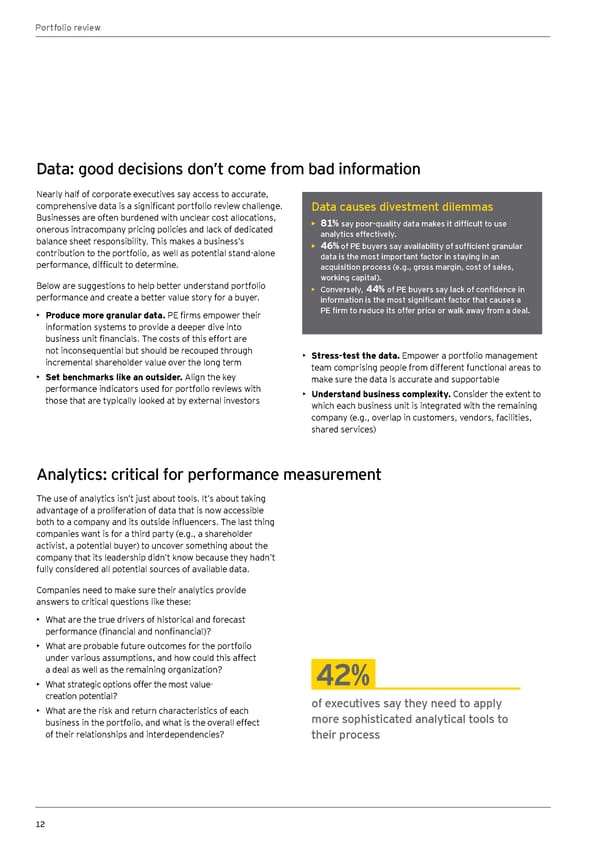Portfolio review Data: good decisions don’t come from bad information Nearly half of corporate executives say access to accurate, comprehensive data is a significant portfolio review challenge. Data causes divestment dilemmas Businesses are often burdened with unclear cost allocations, • 81% say poor-quality data makes it difficult to use onerous intracompany pricing policies and lack of dedicated analytics effectively. balance sheet responsibility. This makes a business’s • 46% of PE buyers say availability of sufficient granular contribution to the portfolio, as well as potential stand-alone data is the most important factor in staying in an performance, difficult to determine. acquisition process (e.g., gross margin, cost of sales, Below are suggestions to help better understand portfolio working capital). performance and create a better value story for a buyer. • Conversely, 44% of PE buyers say lack of confidence in information is the most significant factor that causes a • Produce more granular data. PE firms empower their PE firm to reduce its offer price or walk away from a deal. information systems to provide a deeper dive into business unit financials. The costs of this effort are not inconsequential but should be recouped through • Stress-test the data. Empower a portfolio management incremental shareholder value over the long term team comprising people from different functional areas to • Set benchmarks like an outsider. Align the key make sure the data is accurate and supportable performance indicators used for portfolio reviews with • Understand business complexity. Consider the extent to those that are typically looked at by external investors which each business unit is integrated with the remaining company (e.g., overlap in customers, vendors, facilities, shared services) Analytics: critical for performance measurement The use of analytics isn’t just about tools. It’s about taking advantage of a proliferation of data that is now accessible both to a company and its outside influencers. The last thing companies want is for a third party (e.g., a shareholder activist, a potential buyer) to uncover something about the company that its leadership didn’t know because they hadn’t fully considered all potential sources of available data. Companies need to make sure their analytics provide answers to critical questions like these: • What are the true drivers of historical and forecast performance (financial and nonfinancial)? • What are probable future outcomes for the portfolio under various assumptions, and how could this affect a deal as well as the remaining organization? 42% • What strategic options offer the most value- creation potential? of executives say they need to apply • What are the risk and return characteristics of each more sophisticated analytical tools to business in the portfolio, and what is the overall effect of their relationships and interdependencies? their process 12
 Global Corporate Divestment Study Page 11 Page 13
Global Corporate Divestment Study Page 11 Page 13